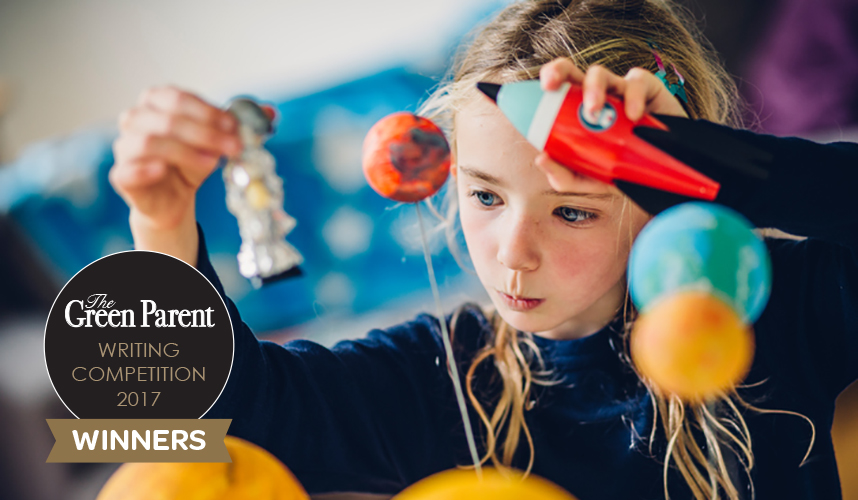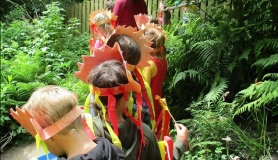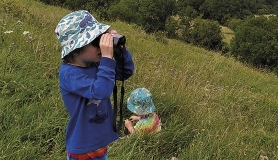However, my children choose school. For them, it is an actual choice, they know they could choose to learn away from school if they want but they want to go to school.
So my dream of unschooling them, has it gone? I’m not sure. Looking at a week day, they spend 6 and a half hours at school. It’s a lot, when they first started I mourned the loss of my time with them; I felt a bit like I had lost them to school. They spend 6 and a half hours at school but actually the rest of the day at home. For my children, that means 5 and a half waking hours each week day at home, plus weekends, plus school holidays; so I actually spend more time with them than they spend at school.
So can I unschool? In a way, yes. Unschooling is “trusting our kid’s ability to learn” (1) and allowing children to choose what they learn. “Unschoolers don’t use a curriculum… Children learn whatever they are interested in”(2). I can, and do, listen to and respond to my children’s interests. They can ask if red and white toadstools are real or just in story books? I can discuss this and then leave out a fungi identification book. If they want to make a model rock pool, I can help provide the resources. There is no set curriculum at home they are definitely free to learn about whatever they want and if there is something they are not interested in they do not have to learn about it at home.
I am a big fan of ‘strewing’. A term coined by Sandra Dodd which means simply leaving things of interest out for your child to discover (3). The example of the book about fungi being left out on a table is strewing as is leaving the laptop I am using right now out and available for my children to use. After logging off to pick them up from school I left the laptop on the dining room table. My daughter came home, saw the laptop and started to make a Power Point based on learning about Romans at school. I was planning to do some more writing but it wasn’t urgent so I let her carry on whilst her interest was there. I do this regularly, just as an unschooling family might. Sometimes I predict correctly and it sparks my children’s interest other times it gets ignored. This is fine and I simply continue to watch and discuss my children’s interests with them. Sometimes, as in the laptop, it is totally unplanned but I try, as much as possible, to allow the learning to continue and progress until my child chooses something else to do.
Just like many unschooling families, we do little formal learning at home. I do for example, from time to time, buy maths workbooks and add these to my strewing resources but most of our maths activities involve real life maths. This might include weighing ingredients for a recipe, working out how much pocket money they have got and discussing maths concepts e.g. How long is it before we go out? I would be very happy to do more formal learning at home but my children simply do not want to plus the truth is most of their school day is formal directed teaching so there is no wonder they wish to direct their own learning at home. Homework is sent home each week from school and I add this to my strewing resources, leaving it out to see if it sparks interest or sometimes suggesting a homework activity. Last term my 9 year old’s homework was about weather and one of the activities was cloud gazing. I planned to suggest this on an appropriately cloudy day and see if she wished to lie in the back garden and gaze up at the sky. “Maybe we will draw the clouds, maybe we won’t” I thought. She did decide to sketch a few and so did I, we also looked up the names of different cloud formations and tried to identify them, this was then stuck in her homework book. I encourage her to complete her homework and create time for this to happen but I leave it up to her to decide when, where and if she does her homework.
Although teacher-trained, I see my role at home as a facilitator of learning rather than a teacher.
Is this really unschooling? The answer is no not really! There are so many elements of my children’s lifes that are not in line with the unschooling movement. Having to be at school is obviously one! Not being able to continue with learning at home immediately the next day is another. For example, if they are engaged in making a lego model one day they can’t carry on with this until after 3.30 the next day, by which time the motivation may well have gone. I can, however, leave the model out for them to return to. They are also required to comply with a range of rules and structures within school that would not be part of an unschooled child’s life.
My children choose school and I respect their decision. There are lots of drawbacks: a national curriculum that doesn’t always fit their needs, having to attend when a day at home sounds more appealing but they get lots of benefits: enthusiastic adults who want them to learn, facilities I would struggle to provide at home, independence that they want, and for me, as an introvert, I have some peace and quiet regularly at home. In many ways, having school-attending children works for all of us. However, I know learning does not simply take place in school during lesson time. Learning happens anywhere and everywhere. As a parent it’s easy to feel that school has the responsibility for our children’s education and the parenting role is something separate. Obviously parenting encompasses so much more than the education of the child but parents do have a starring role in their child’s learning. “The parent is the child’s first teacher” is true but parents continue to have a fundamental role in a child’s education, not just in supporting the work taking place in school (although this is important) but in providing learning opportunities in addition to this. As George Santayana said “A child educated only at school is an uneducated child.” Parents are brilliantly placed to respond to individual needs (which, let’s be honest, is very difficult for a teacher with a class of 30 pupils). We are not confined to a specific curriculum with targets and deadlines we can go at the pace of our child (if we can keep up!) and with the energy and resources of our own unique family. I know I am bit “teachery” in my thinking, my background and career definitely influence my parenting and my confidence to support my children but I believe parents are the expert in their child and can be the facilitators for their children to pursue their individual interests whether the child goes to school or not.
I know I am lucky through my personal circumstances and work commitments to be able to spend so much time with my children, I know this isn’t the same for everyone. I know I am writing this from a place of privilege, having the head space and resources to support my children’s interests. Everyone’s family is different and that is a good thing. I just believe all parents whether unschoolers or not can (and usually do) positively contribute to their child’s learning.
As my children attend school, I have to compromise more than an unschooling family and adjust our days to fit school in. It also means most days I am left with the ‘tricky’ part of the day with my children! If you have children at school you will know what I mean. Tired and hungry children can be a challenge in the hours after school. However I am still grateful I have the majority of their time with me to explore and learn about the world together.
1 www.lulastic.co.uk/unschooling/what-is-unschooling
2 www.happinessishereblog.com/2015/11/what-is-unschooling
Sarah Allen lives in Devon with her husband and two children, aged 7 and 9. She writes about eco-friendly living, creating natural childhoods and respectful parenting at www.rhubarbandrunnerbeans.co.uk and on Facebook and Instagram.







